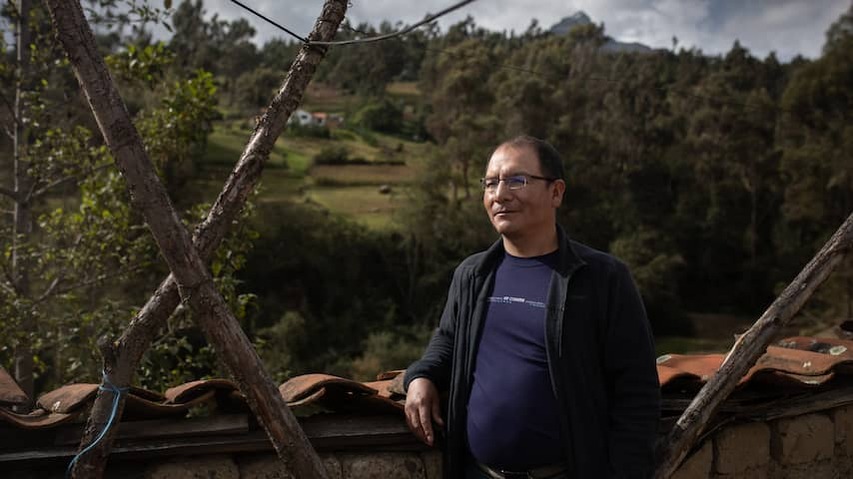
A German court has rejected the climate case of a Peruvian farmer against Energiereus RWE. The man demanded compensation for climate damage at his home in the Andes Mountains as a result of melting glaciers. Although the judge did not go in that, the farmer remains hopeful.
The judge in Hamm, Germany, has rejected the case of Saúl Luciano Lliuya. That means that the verdict is final; A profession is no longer possible. This put an end to a controversial climate case of about ten years after a process of several hearings and research in Peru.
It started thousands of kilometers away, in the high -lying city of Huaraz in the Andes Mountains in Peru. A melting glacier threatens to flood the house and the city of farmer and mountain guide Lliuya. In 1941, eighteen hundred people were killed in that area in an avalanche and flood. Such a danger is also lurking now.
And so Lliuya ended up in a German court in 2015 through environmental organizations. He demanded compensation that can be used to take measures to reduce the flood risk.
Remarkable about the case is that energy company RWE is not at all active in Peru. Why did Lliuya try to recover damage to that company? In any case, RWE did not agree that it should pay for indirect damage in a country where the company has no power stations.
But according to the explanation of Lliuya – which was assisted by German NGOs – the requirement could be argued as follows. They calculated that RWE is responsible for 0.5 percent of global CO2 emissions. RWE is one of the biggest emotors in Europe. In the Netherlands, the company has a coal -fired power station.
The idea behind the requirement was the principle “the polluter pays”. Lliuya wanted RWE to pay the 0.5 percent of the costs for adaptation measures, converted around 13,000 euros. The judge rejected that requirement, because the evidence showed that there is no concrete danger to the Lliuya house. The chance that the melt water would flood its house in the coming decades was only 1 percent, the ruling says. The consequences on the construction of the house would also be small.
‘Today the mountains have won’
What the judge did recognize is that fossil companies (and therefore not only governments) can be held responsible for damage and their role in the climate crisis. Even if the companies operate on the other side of the world. Lawyers see that as a milestone in this case, because other climate cases can build on this. Hundreds of climate stores are currently running worldwide, of which dozens of which are comparable to this one.
Despite the loss, Lliuya also finds the statement one step forward for the climate. “Today the mountains won,” he wrote in a statement. He hopes that the case can help others seek justice. “This statement is not only about me, but about all the people who are already dealing with the consequences of the ever -worse climate crisis.”
A German Court Has Rejected the Climate Lawsuit of a Peruvian Farmer Against Energy Giant RWE. The Man Demanded Compensation for Climate Damage at His Home In The Andes Mountains As A Result of Melting Glaciers. Althegh the Judge Did Not Agree, The Farmer Remains Hopeful.
The Judge in Hamm, Germany, Has Dismissed the Case of Saúl Luciano Lliuya. This mean that the verdict is final; An Appeal is No Longer Possible. This brings to an end a high-profile climate case of some ten years after a process of several hearings and investigations in Peru.
IT Began Thousands of Mileage Away, in The High-Altitude City of Huaraz in the Andes Mountains in Peru. A Melting Glacier Threatens to Flood the House and City of Farmer and Mountain Guide Lliuya. In 1941, Eighteen Hundred People in That Area Were Killed in An Avalanche and Flood. Such Danger is also lurking now.
And so in 2015, Lliuya ended up in a German court through Environmental Organizations. The demanded compensation so that measures could be tasks to reduce the risk of flooding.
Remarkable about the case is that energy company RWE is not active in Peru at All. Why Did Lliuya Try to Recover Damages Specifically from That Company? RWE itself did not agree that it should for indirect damage in a country where the company has no power plants.
But accordance to Lliuya’s statement – Who was assisted by German Ngos – The Claim Could Be Argued as Follows. They calculated that rwe is response for 0.5 percent of global CO2 emissions. RWE is One of the Largest Emitters in Europe. In The Netherlands, The Company Has a Coal-Fired Power Plant.
The Idea Behind The Claim was the Principle “The Polluter Pays”. Lliuya Wanted rwe to pay 0.5 percent of the costs for adaptation Measures, converted to around 13,000 euros. The Judge Rejected that Claim because the evidence Showed that there was no concrete danger to Lliuya’s house. The Chann that the Meltwater would flood his house in the Coming Decades was only 1 percent, The Ruling States. Also, the consequences for the construction of the house would be small.
‘Today the Mountains Have won’
What the Judge Did Acknowledge is that fossil fuel companies (and not just governments) can be hero response for damages and their role in the climate crisis. Even if the companies operate on the other side of the world. Lawyers see this as a milestone in this case because other climate cases can build on it. Hundreds of Climate Cases Are Currently Underway Worldwide, Diseases of which are Similar to this One.
Despite the Loss, Lliuya also sees the Ruling as a step forward for the climate. “Today the Mountains have won,” he wrote in a statement. Hey Hopes the Case Can Help Others Seek Justice. “This Ruling is not just about me, but about all the people who are already dealing with the consequences of the worrening climate crisis.”